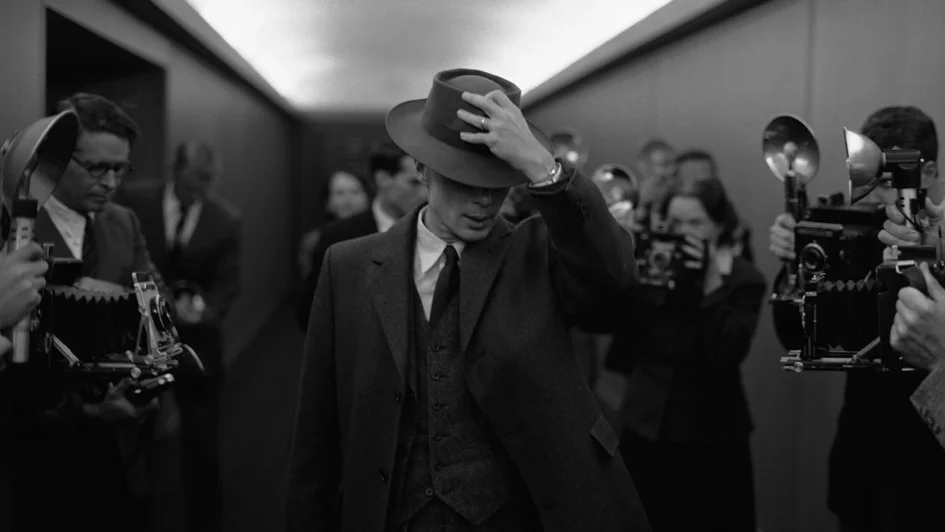J. Robert Oppenheimer, to be honest, was a person I had never heard of until I came across Christopher Nolan’s latest film. As a diligent researcher, I felt compelled to delve into his tale and uncover the reasons behind his fame, prompting a renowned director like Nolan to adapt his biography. What I discovered left me deeply unsettled. Oppenheimer’s life was not a work of fiction, but a true account. His contributions led to the development of the most catastrophic weapon ever conceived by humankind, sending chills down my spine.
Oppenheimer, a scientist President Franklin D. Roosevelt appointed, played a significant role in the Manhattan Project. Alongside Leslie Groves, the project’s director, he established a complete town named Los Alamos in a remote desert of New Mexico.
Within this secluded enclave, a dedicated team of scientists and military personnel tirelessly labored to develop the world’s first nuclear bomb. The culmination of their efforts came in the form of a nuclear test codenamed Trinity. However, the subsequent deployment of this weapon against Japan weighed heavily on Oppenheimer’s conscience. He was so troubled by the consequences that he delivered a letter to Secretary of War, Henry L. Stimson, advocating for a permanent ban on nuclear weapons.
While working on Tenet, Christopher Nolan discovered the story of Oppenheimer. In the context of the movie’s central theme, which explored the concept of undoing a catastrophic invention, Oppenheimer’s speeches and writings resonated profoundly. The parallels between Oppenheimer’s reflections and the film’s premise were strikingly aligned. Thus, the movie was funded by Universal in 2021 and released to theaters on July 21, 2023.
Given that the movie closely mirrors the critical milestones of history, I’ll refrain from providing a detailed summary. I must express my immense entertainment derived from this cinematic experience. The narrative, while maintaining historical accuracy, skillfully incorporates a tasteful dose of creative liberties, rendering it significantly more captivating than the mundane facts of reality.
Christopher Nolan’s adeptness at sculpting a stunning cinematic masterpiece is evident once more. Oppenheimer has afforded him the opportunity to infuse his storytelling prowess into a narrative firmly rooted in reality, a formidable feat for any filmmaker to successfully accomplish. Yet, his remarkable abilities have triumphed once again, shedding light on himself and on the entire ensemble of actors and crew members, warranting consideration for esteemed award nominations.
Oppenheimer stands out as a remarkable film, not solely due to its narrative, but because it forcefully breaks through the stifling stagnation that has ensnared the realm of cinematic offerings for years. Film studios wield immense resources to conjure innovative and novel productions. However, a handful of premier studios appear to be ensnared in their own version of creative barriers. Our current era is inundated with a deluge of remakes, reboots, sequels and prequels. Through the incessant reuse of characters, studios have unwittingly instilled a sense of what I can only describe as fatigue within the general populace.
We encounter recurring tales with identical plots in nearly every cinematic creation. The fervor ignited by a character’s introduction is subjected to an arduous test with each subsequent sequel, often yielding diminishing returns. This erosion prompts the audience to question the very foundation of their initial affection for these characters. Even iconic figures like those found in the Star Wars and Marvel Universes experience a meteoric rise, only to wane significantly after appearing on the big screen numerous times.
Oppenheimer presents a riveting narrative delving into the life of a man responsible for conceiving one of the most lethal inventions in history. The weight of this knowledge cast a haunting shadow over him for the entirety of his existence. Unintentionally (or uncaringly) releasing this force, he grappled with the profound consequences. A tale so compelling practically unfurled on its own, resonating deeply with individuals who can empathize with its essence. While our personal regrets may not have unleashed a metaphorical hell on Earth, each of us carries moments we wish we could undo. This relatability serves as the underpinning of the story’s appeal.
Christopher Nolan and his team augments an already relatable account, and the film stands as a singular creation: a self-contained masterpiece devoid of the need for sequels or prequels. Within the three-hour runtime of Oppenheimer, every element necessary for captivation is meticulously presented. This portrayal encapsulates all that is essential to leave us thoroughly entertained.
I unequivocally award Oppenheimer a resounding five out of five stars. The entire ensemble delivers impeccable performances, yet it is Christopher Nolan who truly shines. He transforms what could have been a mundane history lecture into an artistic triumph. While every contributor merit commendation, Nolan’s absence would have rendered this film a challenging viewing experience. He masterfully elevates this historical account into a cinematic gem, deftly shattering the stifling creative inertia plaguing much of contemporary film.
As the awards season approaches, it is a formidable task for any contender to surpass Nolan and the exceptional team behind Oppenheimer. Their potential to dominate the field is undeniable.

